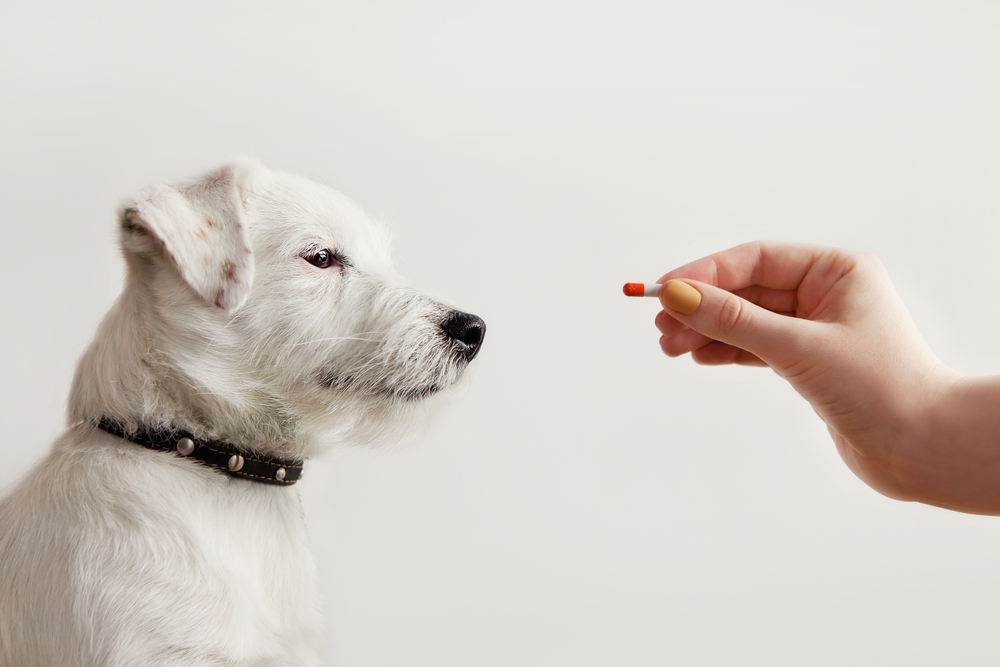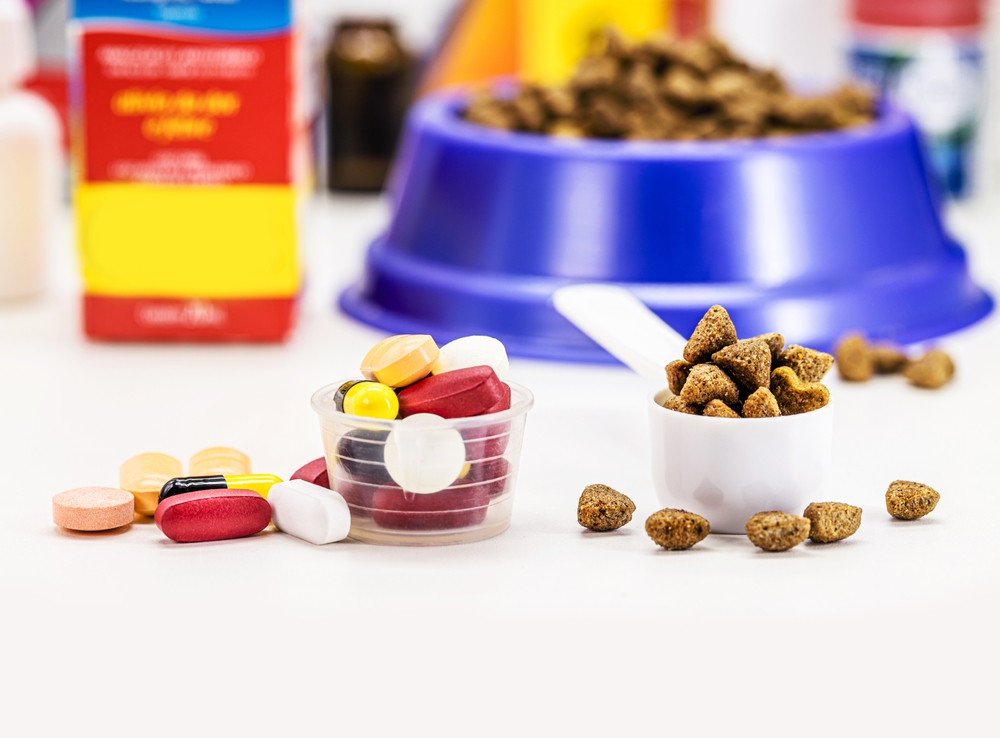Do you know what to do when your dog is not feeling well? Should you call your vet or get medication from your cabinet?
We love our dogs so much that we treat them like children. In exchange for their unconditional love and loyalty, we provide the best care for them and treat them like family members. While there is no harm in spoiling our beloved pets, there are some aspects where it is vital to remember that our fur babies are not humans and have different needs.
Humans and dogs have very different needs regarding health issues and medicine. The fact that we don’t go to the same doctor or pharmacist may indicate this. If your dog is not feeling well, you may be tempted to try something from your medicine cabinet to help it. But just because something is safe for you doesn’t mean it is safe for your pet. Many medications we usually use can be highly toxic to pets, and they can even cause death. Some human medications are used in veterinary medicine, but the dosage is different, especially if you have a smaller dog.
Even if you are careful what your dog eats and only give it medicine prescribed by the vet, sometimes accidents can happen. Dogs are extremely curious. If you drop something on the floor, it disappears in seconds. If this scenario, which we hope you never have to experience, still happens, it is essential to act fast. Adverse reactions can range from gastrointestinal irritation to more serious problems like seizures or kidney failure.
It is essential to keep medications securely stored and out of reach of dogs. If an accident still happens, immediately bring your dog to a veterinarian and bring the original container. The container will give the doctor information about the exact drug and the strength of the drug that your dog ingested.
We all hope that we never have to deal with the scenario in which our furry best friends get poisoned by accident, but if it happens, it is better to be prepared. Here is a list of the 10 most common human medications that can cause dog poisoning so you can keep them out of reach from your dog.

1. NSAIDS (Ibuprofen, Aleve, Motrin, etc.)
Most households have nonsteroidal anti-inflammatory drugs (NSAIDs), which are used to treat fever, pain, or inflammation in children and adults. Some examples of NSAIDs include aspirin, ibuprofen (e.g., Advil and types of Motrin), naproxen (e.g., Aleve), and indomethacin.
Just one tablet can be toxic for dogs. Two NSAIDs can lead to kidney dysfunction. The most common side effects of these medications are gastrointestinal irritation and damage to the GI tract.
2. Acetaminophen (Tylenol, etc.)
Tylenol is a drug found in every American household. Since it is used to reduce pain and fever in babies and children, some pet owners may think it is a good idea to also treat their dogs with it.
Most acetaminophen poisonings in dogs occur when a well-intentioned owner administers them to treat fever, pain, or inflammation. Dogs do not metabolize this medication like humans, and overdose can cause many complications, including liver failure and red blood cell damage.
One acetaminophen tablet can affect red blood cells, which transport oxygen throughout the body. A lack of oxygen can make your dog feel tired or weak, and it may experience shortness of breath or an irregular heartbeat. Swelling of the face and paws is also a common symptom of acetaminophen poisoning.
3. Antidepressants (Effexor, Cymbalta, Prozac, Lexapro, etc.)
You may not know this, but actually, this kind of drug can sometimes be prescribed for dogs. Even our pets deal with anxiety, trauma, and depression, and antidepressants could be a beneficial part of helping them feel more confident and comfortable.
As I mentioned before, the dose and concentration of a drug are vital and make the difference between a helpful treatment and poisoning. Side effects in case of an overdose can range from incoordination, tremors, and seizures and, in some cases, can also lead to an elevated heart rate and blood pressure.
4. ADD and ADHD Medications (e.g., Concerta, Adderall, Ritalin)
Medications used for attention-deficit disorder and hyperactivity are highly toxic to dogs and other pets. These drugs contain amphetamine and methylphenidate, a potent stimulant. Even a tiny quantity can cause life-threatening seizures, tremors, and even cardiac and respiratory arrest.

5. Benzodiazepines and Sleep Aids (e.g., Xanax, Klonopin, Ambien, Lunesta)
Veterinarians say they see many cases of dogs who accidentally ingest sleeping pills. Usually, owners forget to put their pills on the nightstand, and dogs who sleep in the same bed get curious and eat the pills.
These drugs are meant to reduce anxiety and help with sleep, but in dogs, they can have the opposite effect. Some dogs become lethargic and experience dangerously slow breathing rates or an irregular heartbeat. However, others can become highly agitated, hyperactive, and aggressive and experience excessive drooling and tremors.
6. Birth Control (e.g., Estrogen, Estradiol, Progesterone)
Birth control pills are the most frequently eaten medicine by dogs. This happens because owners don’t usually keep them in the cabinet. Since they must be taken daily, birth control pills are typically stored in an easy-access place. Another reason may be that dogs enjoy chewing on the package and the sound it makes.
While it’s never a good idea for your dog to eat human pills, fortunately, small amounts of birth control pills have a low concentration of hormones and typically don’t cause problems. There is a more significant concern about the ingestion of the package, which can cause intestine blockage.
A higher dose of hormones from birth control ingestion can cause a mild upset stomach and, in female dogs, inflammation of the genital area. In rare cases, if a dog consumes a huge amount of estrogen, there are rare reports of possible bone marrow suppression. This can be a severe complication, so contact a veterinarian immediately.
7. ACE Inhibitors (e.g., Zestril, Altace)
These medications treat high blood pressure by widening the diameter of the blood vessels so more blood can pump through the veins and vessels. Low doses, when ingested, may only cause mild symptoms. But when taken in excess, it can be life-threatening.
Call your doctor immediately if you suspect your pet has consumed blood pressure medication. An overdose will cause your pet’s blood vessels to relax, more blood and oxygen will flow through the heart, and the heart will slow down. Also, the body cannot handle the volume of blood flow, leading to internal organ malfunctions and the failure to perform their jobs properly.
8. Beta-Blockers (e.g., Tenormin, Toprol, Coreg)
Beta-blockers are medicines also used to treat high blood pressure. However, unlike ACE inhibitors, even the smallest ingestions of these drugs may cause severe poisoning in pets. Overdoses can cause dangerous, slow heart rate and life-threatening decreases in blood pressure.
If you have this kind of drug in your house and you observe that your dog is lethargic, has difficulty breathing, and you suspect it has a low heart rate, don’t wait. Rush to your veterinarian immediately.

9. Thyroid Hormones (e.g., Armour Desiccated Thyroid, Synthroid)
Like people, dogs can have low thyroid levels and require supplementation. That is why an accidental ingestion of thyroid medicine usually goes undetected, as it usually has no symptoms. However, large amounts of medication ingested can cause muscle tremors, nervousness, aggression, and an elevated heart rate.
10. Cholesterol-lowering Lowering Agents (e.g., Lipitor, Zocor, Crestor)
Cholesterol-lowering medications, often called statins, cause mild vomiting and diarrhea if ingested. Any severe side effects seen in pets would result from long-term, not one-time, ingestion.
If your pet accidentally eats medicine, don’t wait for symptoms to appear. Go directly to the veterinarian! Early treatment is essential to prevent toxicity. Remember to bring the bottle or package when you seek emergency care so the vet knows what they are dealing with.
When it comes to medication, you need to doggy-proof your home. Just like with toddlers, you must assume anything can happen and be prepared for it. Dogs will chew on anything, especially if you have a puppy.
Despite what you may read online, it is never okay to take any medication without consulting a medical professional first. This should be a rule, whether it’s medication for you, your kids, or your pets.
This Amazon pet first aid kit is essential for quick intervention in an emergency.
If you found this helpful information, you should also check out: 9 Dog Health Problems Every Pet Parent Should Know.












